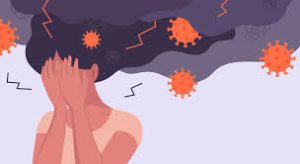 About one in eight individuals develop long Covid following Covid-19 infection.
About one in eight individuals develop long Covid following Covid-19 infection.
Hispanic and white adults have higher rates of long Covid and Asian than black adults.
Adults to receive the COVID-19 vaccine booster were less likely to report ever long Covid than those who did not.
Adults in poor and low income households were no more likely to report ever having long Covid than those in middle and high income households.
About 7% of US adults have a post COVID-19 condition.
Estimated 17 million people in the US currently have long Covid based on National Center for Health Sitatistics (2024).
More than 200 symptoms and signs and 50 conditions have been attributed to long Covid.
Females are more likely to report symptoms of long Covid.
This definition includes symptoms are present for four weeks after the initial phase of infection.
It may be multi systemic:reported to accept nearly every organ system.
Long Covid symptoms may worsen over time and can contribute in a pattern of relapse and recovery.
It may present with relapsing-remitting pattern and progression or worsening over time and the possibility of severe and life-threatening event, even months or years after infection may occur.
The most frequent symptom is fatigue.
It’s cardinal features include fatigue, dysautonomia, what postural orthostatic, tachycardia syndrome, post exertional, malaise, and cognitive difficulties referred to as brain fog.
Brain fog, problems with focus, memory, or recollection, sleep disturbances, mood changes, headaches, loss of taste and smell, heart palpitations, dizziness, shortness of breath, cough, chest pain, diarrhea, stomach pain, joint or muscle pain, rashes, feelings of pins and needles are common.
The initial onset of substance use disorder may occur, and it may exacerbate obsessive-compulsive disorder and post traumatic stress disorder.
It may be related to psychosis and sleep disorders.
A history of anxiety, depression, loneliness, and stress correlates with a greater risk of long Covid.
Patients report, difficulty remembering, concentrating, and making decisions at a greater rate than at any time in the preceding 15 years.
Modest cognitive decline occurrd with the original virus and with each viral variant.
A 3 point loss in IQ was seen in Covid infected participants, even in those with mild COVID-19 and resolved symptoms.
Patients with unresolved persistent symptoms had the equivalent of six point loss in IQ and those admitted to an ICU had an equivalent of nine point loss in IQ.
Patients with greatest loss in IQ include those with longer hospital stays and duration of acute illness.
Memory, reasoning in executive functioning tasks by the most sensitive indicators of impaired function.
Reinfection contributed in additional loss of IQ of nearly 2 points compared with no re-infection.
Mental health symptoms are increased in long Covid and are related to pre-existing comorbid condition, hospitalizations and severity of COVID-19 illness.
Women are more likely to have long Covid related mental health systems as are Blacks, Hispanics, Latinos and indigenous populations.
People with disabilities have a greater than 80% incidence of long Covid and the rate is also more than double among transgender than cis gender males.
Patients with the history of hypertension, chronic lung disease, obesity, diabetes, and depression have higher rates of long Covid.
Among critically ill patients with COVID-19 randomized to receive an IL-6 receptor antagonist had a greater than 99.9% probability of improved 180 day mortality compared with patients randomized to a control group, and treatment with an anti-platelet agent had 95% probability of improved 180 day mortality compared with a randomized control group.
Studies of long Covid show prolonged neuroinflammatory responses, structural abnormalities, and accelerated aging in the brain.
COVID-19 virus was found to be present in brain tissue samples obtained during autopsy.
Gut dysbiosis, dysfunctional hypothalamus/pituitary response, and low serotonin dysfunction in vagal stimulating signaling they play a role in Covid infection impaired cognition.
The pathogenesis of long Covid-19 is complex and depends on several driving factors, including the persistence of SARS-CoV-2 in different organs; reactivation and response to unrelated viruses, such as Epstein–Barr virus; autoimmunity; sustained inflammation; and microvascular thrombosis.
Thenclinical picture is reminiscent of chronic fatigue syndrome or myalgic encephalomyelitis, which occurs after viral infections, in which acute-phase proteins have emerged as correlates of disease activity.
A set of acute-phase proteins, including C-reactive protein and molecules involved in iron metabolism, emerged as part of an inflammation and stress-response signature predictive of long Covid.77
Profound perturbations of myeloid-cell function has been observed 8 months after mild-to-moderate Covid-19.
A set of biomarkers (interferon-β, interferon-γ, interferon-λ, interleukin-6, and PTX3) is associated with long Covid-19.
Changes in acute-phase protein levels may help to define the actual borders of this universe, its diversity, and the prognosis of organ involvement.
